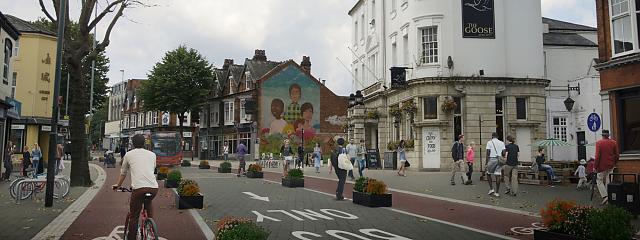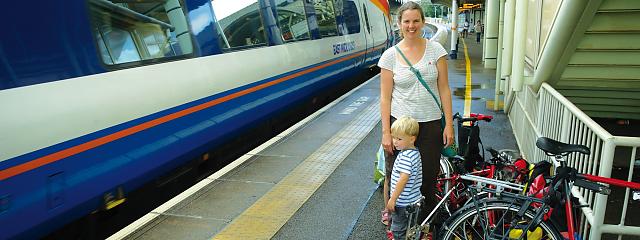
Bad train trip? Share your experiences of taking bikes on trains
Bad train trip? Share your experiences of taking bikes on trains
After last year's fiasco over changes to rail timetables, Transport Secretary Chris Grayling announced a long-overdue review of Britain's railways last September, to be led by Keith Williams, deputy chairman of the John Lewis Partnership and a former Chief Executive of British Airways.
The review's Call for Evidence opened last December, however it was only in February that the review team set out some proposed objectives and a set of evidence papers to help inform the review.
One of those evidence papers covers the passenger experience. So we hoped perhaps that it would include something about the experiences of people trying to combine rail travel with cycling at one or both ends of the journey. Nope, not a thing!
It doesn't say anything about carrying luggage either. Or anything about combining cycling with public transport.
The potential for cycle-rail
The cycle-rail combination can provide a huge range of benefits:
- For passengers, it provides a convenient and healthy way to make door-to-door journeys without depending on private cars. For non-drivers (including many younger and older people, and some people with disabilities), this is a vital option for independent travel. But even for those with the option of driving, the decision to cycle to and from the station instead can massively save on time and money. This includes not only the cost of petrol and car parking space, but also the delays in walking across large car parks, the delays getting out of them, and the further delays in making cross-town interchanges or waiting for other public transport connections.
- For rail operators, it delivers a 16-fold increase in the area from which people can get to the station within (say) 10 minutes under their own steam. It also saves on the (often huge) costs of providing car parking spaces for passengers, while maintaining the viability of more lightly used train services.
- For society in general, it helps reduce congestion, road danger, physical inactivity, air pollution and greenhouse gas emissions. It also helps reduce overcrowding on other public transport services (think how much more crammed London's tube trains would be in rush hour without all the recent growth in cycling from London's mainline stations). Finally, it can provide huge benefits to rural economies, bringing visitors out into the countryside as well as keeping their train services afloat financially.
In the Netherlands, 42% of rail passengers get to the station at the home end of the journey by cycle, while 11% cycle at the non-home end of their journey. Dutch train stations invariably have huge amounts of cycle parking space, with cycle hire facilities at larger stations.
By contrast, in 2015, just 4.4% of Britain's train passengers cycled at one or both ends of their journey. That was 47 million cycle-rail trips out of 1.69 billion rail journeys.
The good news is that number was up by 40% compared with 2010, largely thanks to investment in cycle parking at train stations. Station cycle parking is a highly cost-effective way to increase cycle use, increase rail patronage and reduce car travel to stations.
Better still, the Government has set an ambition to make cycling and walking the normal choices for short journeys or as part of a longer journey. More immediately, it aims to double cycling 'stages' from 0.8 billion on 2013 to 1.6 billion in 2025 (where a cycling 'stage' is a complete cycling trip or the cycling section of a trip made partly by another means, e.g. cycling to the station).
If the Government is to achieve this aim, the rail industry needs to support it wholeheartedly, as well as being ready to reap the benefits.
The current situation
At present, many rail operators (though by no means all) seem to regard cycling passengers as more of an irritant than an income stream.
Cycle spaces on trains are often ridiculously badly designed, dangling from hooks in tight spaces that anyone who is short, or frail, can't use.
Train companies make up silly rules about carrying folding bikes along the platform rather than wheeling them. They tell you you can't take your bike on a train even when it's virtually empty.
They arrest you for putting your bike on a train 4 minutes before it's supposed to depart, because of some unpublicised rule that you're supposed to be there 5 minutes beforehand.
Too often, they can't tell you whether you need to stand on the platform near the front, middle or back of the train to be near the cycle storage space - then they blame you for delaying the train.
At the other end of your journey, they leave you stuck with your bike in locked compartment when everyone else has got off the train. As for travelling in a group of any size, you've got to be kidding. And disabled people who use pedal cycles (especially non-standard pedal cycles) as mobility aids just don't seem to count as disabled people when it comes to rail travel.
An opportunity
Cycling UK will be responding to the Williams Review, having already sent in an interim response to an earlier call for comments. We will be urging that the Williams Review recommends action on the following broad measures to promote cycle-rail travel:
- Providing safe and convenient cycle access to, from, within and through stations
- Safe, secure, accessible and well-designed cycle parking at stations, together with hire and storage facilities at larger stations
- Providing formal and informal cycle spaces on trains
- Developing convenient ticketing and reservation systems
- Information and publicity
- Supporting large cycling events
- Stakeholder engagement
- Monitoring and review of what is working, to strengthen and improve it.
Read Cycling UK's full response.
Take action
We're also urging Cycling UK members and supporters to respond to the review, backing up these calls but adding in your own experiences as a cycle-rail passenger, to make the case that the 'Passenger Experience' really needs to includes experiences such as yours!
The way the consultation is structured means you'll need to write your response in Microsoft Word or an Open format document. There are no fixed questions and it doesn't have to be long. Just say you support Cycling UK's headline calls, as outlined above or in our draft submission, write up your own experiences, and submit these via the review's website.
But do please also email us a copy of your submission, in an email titled Williams Review response, to campaigns@cyclinguk.org.
With a Government-wide Spending Review also on the horizon, the Williams Review is probably the most important opportunity in over a decade to press for improvements for cycle-rail travel. Hence we look forward to reading your horror stories - but more importantly, we look forward to using them as evidence to seek real improvements, in support of the Government's ambitions to make cycle-rail travel as normal as it is in countries like the Netherlands.
Take action
Tell the Government and rail companies about your experiences of taking your bike or cycle on a train.
Respond to the Williams Review
The way the consultation is structured means you'll need to write your response in Microsoft Word or an Open format document. There are no fixed questions and it doesn't have to be long. Just say you support Cycling UK's headline calls and write up your own experiences and submit these via the review's website.
Tell Cycling UK's Campaigns team
Share your experiences with Cycling UK's campaigns team too. Send them an email titled Williams Review response, to campaigns@cyclinguk.org.











